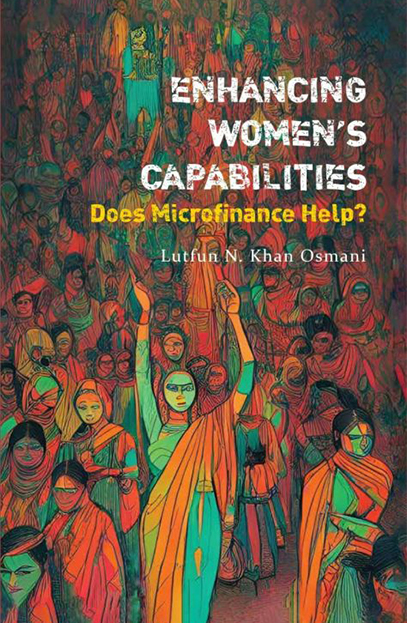- Shop
- Enhancing Women’s Capabilities: Does Microfinance Help?
Enhancing Women’s Capabilities: Does Microfinance Help?
https://uplbooks.com/shop/9789845063951-enhancing-womens-capabilities-does-microfinance-help-8426 https://uplbooks.com/web/image/product.template/8426/image_1920?unique=3d813f3
| Language: English |
Book Info
Women are both the target and the “agency” for the microfinance interventions; yet, curiously, most research on microfinance focuses on the household-level impact, and not on the well-being of the women themselves within the household. This book is an important contribution to fill this gap. Rich in both analytical rigour and the quality of empirical evidence, the book ingeniously applies Amartya Sen’s capabilities approach, as well as the bargaining model of intra-household behaviour, to explore the microfinance impact on female well-being and empowerment. The impact is happily found to be a positive one, albeit within the cultural boundaries of a tradition-bound patriarchal society. — Wahiduddin Mahmud Former Professor of Economics University of Dhaka and the co-author of The Theory and Practice of Microcredit (Routledge, Taylor and Francis) In this important contribution, Lutfun Osmani focuses on the development and use of women’s capabilities in advancing an economy and the underlying society. She investigates the central role of human capabilities, and with that concentration, proceeds to examine the particular role of finance in general and microfinance in particular. The links Osmani brings out have evident practical relevance. In exploring these connections, Lutfun Osmani makes extensive use of evidential information and solidly establishes a practical – and hugely fruitful – line of approach. This is certainly a constructive route to development. — Amartya Sen, Nobel Laureate Thomas W. Lamont University Professor, and Professor of Economics and Philosophy, Harvard UniversityThe practitioners of microfinance have felt all along, based on their field experience, that access to credit can empower poor women and improve their well-being in a way few other interventions can. Lutfun Osmani has provided a robust confirmation of this view through a superb combination of theoretical and empirical research. Her rigorous econometric analysis is based on data obtained from an innovative questionnaire she developed to tread carefully to try to avoid the risk of cliche answers provided by the project and control group women. It is a well written and well-organized book and an important contribution to the literature of microfinance. I recommend the book to all academics and practitioners. — Muhammad Yunus Nobel Peace Prize Laureate 2006 Founder of Grameen Bank

Lutfun Nahar Khan Osmani
Lutfun Nahar Khan Osmani, born and brought up in Bangladesh, was educated in Bangladesh, Finland, and the United Kingdom. She has had a long career in teaching and is passionate about it. She taught at the Queen’s University of Belfast for almost twenty-three years and was a Visiting Professor at BRAC University and North South University of Bangladesh for a number of years. She did her MA in Economics from Dhaka University and obtained her Ph.D in economics from the Queen’s University of Belfast. She has published a number of academic papers on economics and several books of poetry in both Bangla and English. Her passion is to write—be it rhymes, poems, short stories, or for academia.

লুৎফুন নাহার খান ওসমানী
Lutfun Nahar Khan Osmani, born and brought up in Bangladesh, was educated in Bangladesh, Finland, and the United Kingdom. She has had a long career in teaching and is passionate about it. She taught at the Queen’s University of Belfast for almost twenty-three years and was a Visiting Professor at BRAC University and North South University of Bangladesh for a number of years. She did her MA in Economics from Dhaka University and obtained her Ph.D in economics from the Queen’s University of Belfast. She has published a number of academic papers on economics and several books of poetry in both Bangla and English. Her passion is to write—be it rhymes, poems, short stories, or for academia.



